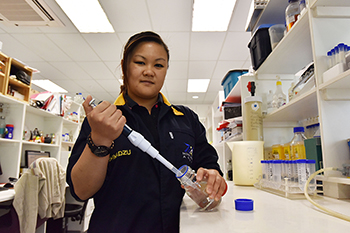Latest News Archive
Please select Category, Year, and then Month to display items
08 May 2024
Photo SUPPLIED

The Dean of the Faculty of Natural and Agricultural Sciences, Prof Paul Oberholster, has the pleasure of inviting you to the inaugural lecture of Prof Dirk Opperman.
Date: 21 May 2024
Time: 17:30
Venue: Equitas
 Click here to RSVP before Wednesday, 15 May 2024. Alternatively, contact Christelle van Rooyen on +27 51 401 9190.
Click here to RSVP before Wednesday, 15 May 2024. Alternatively, contact Christelle van Rooyen on +27 51 401 9190.
About Prof Dirk Opperman
Prof Dirk Opperman obtained his PhD in Biochemistry at the University of the Free State in 2008. This was followed by postdoctoral research on directed evolution with Prof Manfred T Reetz at the Max Planck Institute for Coal Research (Germany). In 2010, he was appointed in the Department of Microbiology and Biochemistry. He subsequently established structural biology at the UFS, and his current research focus lies at the interface of evolutionary and structure-function relationships of biocatalysts, and their application in green chemistry. He is an NRF B-rated researcher with co-authored papers in Science, Nature Communications, and Angewandte Chemie.
His research has been funded by both local and international organisations, ranging from industries such as SASOL to the Global Challenges Research Fund (GCRF, UK). He has a long-standing collaboration with researchers at the Delft University of Technology (TUDelft, the Netherlands) and is currently part of a European Research Area Network Cofund (ERA-NET Cofund) partnership on Food Systems and Climate (FOSC) that develops biocatalysts for upcycling waste.
The impact of personal care products on water resources in the Free State
2015-12-14

Jou-an Chen
Photo: Charl Devenish
|
Water is of the utmost importance in personal hygiene. Most people can hardly have a day go by without taking a shower in the morning and at night. However, it is this very habit that is increasingly polluting the water resources in South Africa.
Contaminants found in pharmaceutical and personal care products have been accumulating in water masses in recent years. These contaminants especially refer to hormones in medication, as well as colouring agents and fragrances used in soap, shampoo and body lotions.
“Little information and data are available on the prevalence of these contaminants, and on how high the level of pollution really is,” says Jou-an Chen, researcher in the Department of Microbial, Biochemical and Food Biotechnology at the UFS.
Her research particularly focuses on the prevalence and impact of those contaminants.
“Because these substances have not been properly investigated, we are not sure how widely it occurs and whether it is harmful to the environment. It was precisely the lack of information that has inspired me to investigate further.”
“If we could identify the contaminants and what it is doing to the environment, it could make a valuable contribution to directives on water quality standards.”